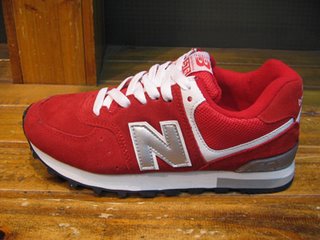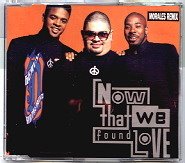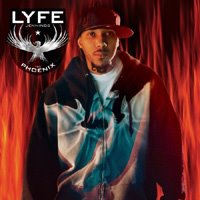Lyfe Lessons
 [NOTE: This post now includes a link to the full song...]
[NOTE: This post now includes a link to the full song...]Sometimes, when I'm waiting for the subway or trying to stay awake during the second act of a particularly heinous play, I imagine myself talking to a passionate reader of "I Totally Hear That." You know, someone who thinks about the blog as much as I do (and shares my enthusiasm for red New Balance sneakers). In all likelihood, this "reader" is just an extension of myself, but I can't afford the therapy to figure out what that means. So for now, let me just say that this Red-Sneakered Reader has been asking me the same question over and over.
"Mark," he asks, " Why do you so rarely write about contemporary hip-hop on this blog?"
And I know he's right to ask. Or I'm right to ask. Or whatever. The point is... I wish there were more contemporary hip-hop that inspires me.
After all, I do like hip-hop. Lauyn Hill? Mos Def? A Tribe Called Quest? Ding! Ding! Ding! And poppier stuff? Don't get me started. I will shoop all night on this fantastic voyage, because I know that mo money means mo problems, okay?
However, I mostly cannot handle the genre's current trend. Songs are built not around sampled hooks but around single repeated notes. As a result, tracks sound flatter, thinned out into a few bleeps from a computer. Producers like Timbaland and Jermaine Dupri are leading the way--just think about Nelly Furtado's "Promiscuous" or Janet's "Call on Me." Plus, entire sub-genres of hip-hop--like the California- based style known as "hyphy"--thrive on this rote approach to musicianship.
 And that bores the hell out of me. As a pop fan, I can certainly embrace formulaic music, but the formula has got to have more shape than, oh, the tuneless drumpad-thumping of a Lil' Jon song. Whenver I hear something like that, I want to teleport myself to a club where they play lots of Heavy D and the Boyz. Now THERE was a rapper who knew how to throw some business underneath his rhymes!
And that bores the hell out of me. As a pop fan, I can certainly embrace formulaic music, but the formula has got to have more shape than, oh, the tuneless drumpad-thumping of a Lil' Jon song. Whenver I hear something like that, I want to teleport myself to a club where they play lots of Heavy D and the Boyz. Now THERE was a rapper who knew how to throw some business underneath his rhymes!But last night, at 1:30 in the morning, I was taking a cab from my power-free Brooklyn apartment toward the lights and A/C of Andrew's Manhattan digs. There on the radio, I heard a new hip-hop song that intrigues me.
 It's called "S.E.X." by Lyfe Jennings (featuring LaLa Brown). (Listen here)
It's called "S.E.X." by Lyfe Jennings (featuring LaLa Brown). (Listen here)At first, the musical situation seems predictable. One or two piano notes sound over and over, a drum machine repeats the same brief pattern, and a violin snippet plays under the chorus.
But then there's Jennings' voice. It's remarkably gruff, and it's twisted by the same Memphis accent that Terrence Howard uses in "Hustle & Flow." He makes ugly sounds, but they're too distinctive to blend in with everything else on the radio.
Then there's this woman, LaLa Brown. She sings with generic breathiness on the chorus, but in the bridge, when she takes over lead vocals, she drops down into a rich alto. It's a sonic surprise, accompanied by the entrance of acoustic guitar (!).
This song may not be changing history, but at least its straying from the pack.
Its words stray even further. Instead of celebrating booty and cash, Jennings and Brown are addressing young women, telling them to think twice before becoming sex objects for men. Jenning uses his barking voice to make proclamations like this:
Life's a trip
Heard you just turned seventeen and finally got some hips
Hustlers on the block go crazy when you lick your lips
But they just want relations
They don't want relationships
And before Brown steps in to sing, she says, "Hey, yo, Lyfe, she might take it better coming from a woman."
For me, that's the moment the song transcends to excellence. As a man telling a woman to respect herself, Jennings has already taken an unusual (for hip-hop) position. Then he steps aside so a woman can speak. This gives the song depth of perspective, suggesting Jennings has the humility both to share the spotlight and admit he doesn't know everything.
The relatively dynamic music, then, gets bolstered by thinking that evolves over the course of the song. "S.E.X." escapes the droning hum of sameness.
 Given Jennings' history, that's not surprising. While serving a prison sentence for arson, he says he was deeply influenced by the spiritually questing music of Erykah Badu. His artistic approach involves vulnerability, emotions, and singing in a really odd falsetto.
Given Jennings' history, that's not surprising. While serving a prison sentence for arson, he says he was deeply influenced by the spiritually questing music of Erykah Badu. His artistic approach involves vulnerability, emotions, and singing in a really odd falsetto.Now I'm not saying that hip-hop doesn't get interesting until it gets sensitive. But sensitivity certainly helps "S.E.X." become an interesting song. And I am happy to put it in my regular rotation.
Labels: R+B / Hip-Hop

2 Comments:
Interesting voice, interesting rhythm. I wish the sample had been longer.
Whoops! Here's a link to the full song... I've updated the site, too...
http://www.myspace.com/lyfejennings
Post a Comment
<< Home